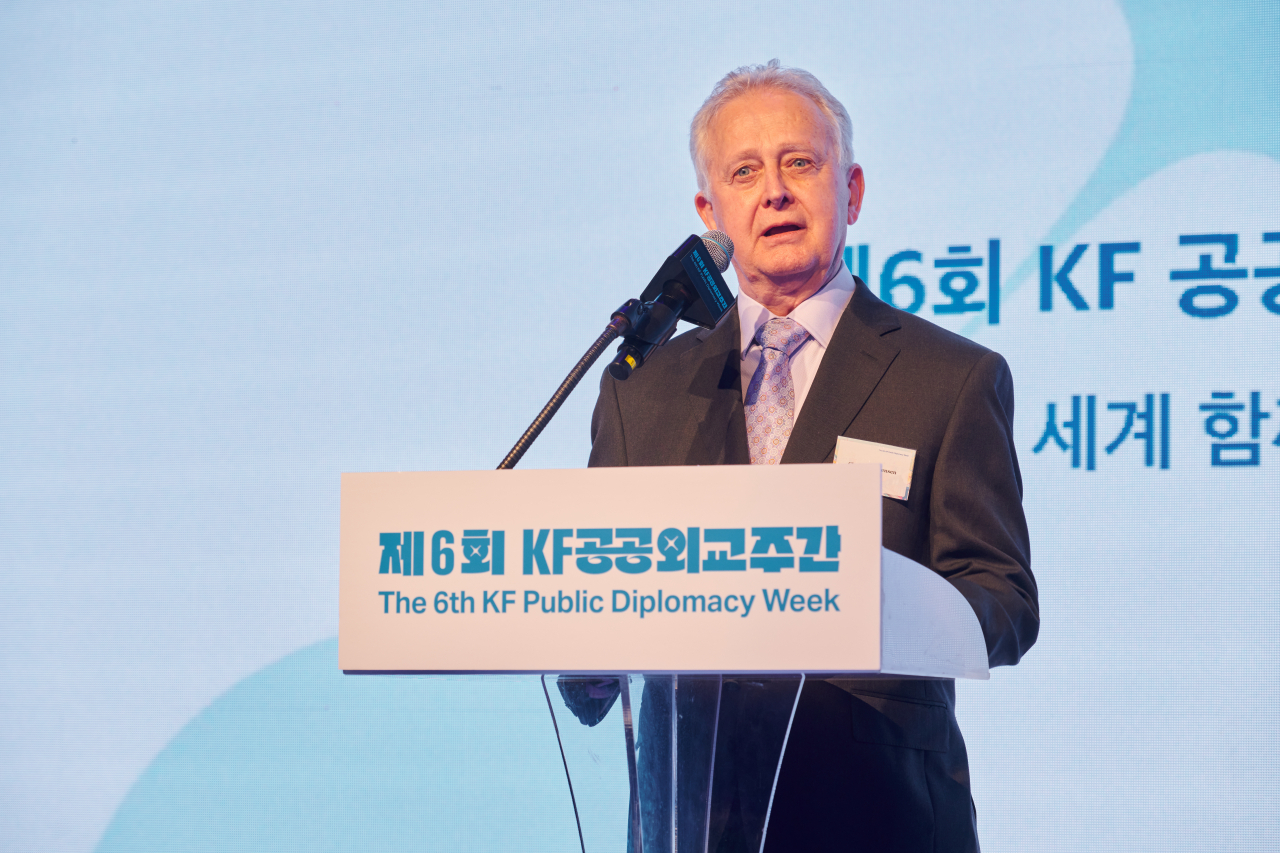 |
Professor emeritus Clark Sorensen gives a speech after receiving the Korea Foundation Award on Oct. 13 in Seoul at the opening ceremony of the 6th Public Diplomacy Week, an annual event organized by the KF to raise awareness of public diplomacy. (Korea Foundation) |
HERALD INTERVIEW
Clark Sorensen, who just retired as professor in June from the University of Washington, won this year’s Korea Foundation (KF) Award last month in recognition of his contributions to Korean studies over the past 25 years.
As professor of international studies at the university’s Jackson School of International Studies since 1992, Sorensen has taught a number of courses on Korea such as “Task Force: Rethinking US Military Bases in Japan and Korea,” “Modern Korean Society” and “North Korean Society.” He also served as editor-in-chief of the Journal of Korean Studies, and has led the university’s Center for Korean Studies since its establishment in 2006.
His choice of Korean studies in the 1970s, however, was “arbitrary,” Sorensen said in an interview with The Korea Herald just before receiving the KF Award on Oct. 13 in Seoul.
“My undergraduate major at UC Berkeley was cultural geography which was almost like anthropology. It’s about how people in different cultures understand their natural environment and how they adapt to it,” he said.
As he was writing a paper about mountains, he came across mountain worship in Korea -- where people go hiking, pick up a stone and place it on a pile of stones on top of a mountain as they make wishes, for instance -- in an encyclopedia about religion and ethics. He found it interesting, and did his fieldwork in Korea from 1976 to 1977.
“People in Korea tend to have a Seoul-centric view of everything. I always worked in the (Korean) countryside and small towns,” said the anthropologist who authored books like “Over the Mountains are Mountains: Korean Peasant Households and their Adaptations to Rapid Industrialization” (1988) and “Spaces of Possibility -- In, Between, and Beyond Korea and Japan” (2016).
Sorensen went to graduate school at the University of Washington because it was the only campus in US mainland that had more than one professor in Korean studies. In addition to language teachers, the school had three professors teaching history, Korean linguistics and Korean literature at the time.
He studied under the late professor James Palais, a first-generation Koreanist who wrote two groundbreaking books on Korean history and trained a generation of Korean studies scholars in the US.
“His example inspired me to continue to develop the Korean studies field at the University of Washington,” Sorensen said during his speech at the KF Award ceremony.
When he became responsible for developing the Korean studies program at the University of Washington, its Korean linguistics professor Fred Lukoff retired in 1989, and the school couldn’t find a proper replacement. When Palais retired in 2001, Sorensen was told that he couldn’t be replaced as his classes had been too small.
Left as the only Korean studies professor, Sorensen thought they could rebuild the program if only they could raise some money. With help from KF and a fundraising campaign among the local Korean community, enough money was raised to endow two professorships in Korean studies.
With grants from the Academy of Korean Studies, the Korea Studies program was elevated to the current Center for Korean Studies in 2006. The new professors and Sorensen increased issues of the Journal of Korean Studies, making it the most prominent North American journal in the field.
Today, interest in Korea has risen remarkably, a stark contrast from “the 70s when no one cared about Korea except for the military and diplomats,” Sorensen said.
“Nobody knows how Korean studies will develop in the future, but because the foundations of Korean studies are now well-laid, we will never again face the ignorance of the 1960s when in-depth knowledge of Korea was not available to the English-speaking world.”
"Korean Studies Beyond Korea” explores the current landscape of Korean studies through interviews, in-depth analyses and on-the-ground stories told from diverse world areas. Funded by the Korea Press Foundation, this series delves into the challenges and opportunities facing the field as Korea's rise as a cultural powerhouse has drawn interest from scholars, researchers and leaders from around the globe. – Ed.







![[Herald Interview] How Gopizza got big in India](http://res.heraldm.com/phpwas/restmb_idxmake.php?idx=644&simg=/content/image/2024/11/20/20241120050057_0.jpg)